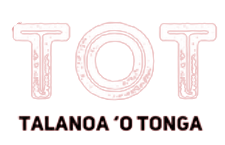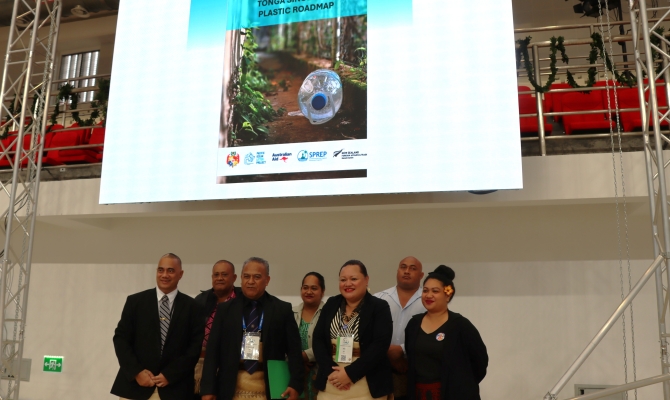Tonga today launched a National Single-Use Plastics Roadmap aimed at phasing out single-use plastics (SUPs) in the country. This strategic roadmap will provide a clear pathway for targeted actions to achieve a cleaner environment and improve waste recycling strategies.
The roadmap was launched at a side event at the 53rd Pacific Islands Forum Leaders Meeting hosted by Tonga this week. The side event was organised by the Secretariat of the Pacific Environment Programme (SPREP) through the Pacific Ocean Litter Project (POLP) funded by the Australian Government.
“Tonga is dedicated to promoting sustainable development by aligning economic advancement with environmental conservation and societal well-being. The objective of the roadmap is to eliminate problematic and unnecessary plastics and guarantee that plastics reaching the end of their life cycle can be reused, recycled, or disposed of sustainably and safely, with minimal impact on the environment,” said Sione Tukia Lepa, the Acting Director, Department of Environment, Ministry of Meteorology, Energy, Information, Disaster Management, Environment, Climate Change and Communication at the launch.
“This transition not only supports the environment but also encourages innovation in materials and processes in Tonga, thus improving the country’s economic position and providing significant social, cultural, environmental, and public health benefits to its people,” Lepa added.
The roadmap aims to reduce and eliminate problematic single-use plastics such as plastic bottles, plastic bags, polystyrene containers, takeaway containers, wraps and straws. These types of waste make up the volume of litter found in coastal areas around Tongatapu as well as the outer islands of ‘Eua, Ha’apai, Vava’u and the Niuas. While some roadmaps have emphasised technical and fiscal measures, the plastics roadmap recognises that influencing the behaviour of both the producers and users of plastic is crucial for achieving lasting positive changes and fostering acceptance of a plastic-free future for Tonga.
The roadmap provides a platform for efficient collaboration of all stakeholders, supporting partnerships to oversee advancements in tackling the very visible problem of plastic pollution, pinpoint areas requiring immediate attention, and catalyse the transition to a plastic-free future for Tonga.
“It is important that we continue to advocate and mobilise support and activities where all key development partners and agencies working in the plastic pollution space, work collaboratively to articulate what the regional and national priorities are, where gaps are for implementation in country and identify implementing and supporting partners, and roll out activities that avoid duplication and support our members who have many competing priorities,” said Ofa Kaisamy, the Manager of the Pacific Climate Change Centre as she spoke on behalf of SPREP at the launch.
“There is more than enough work to go around to support all Pacific Island Countries and Territories. For example, in the roadmap for Tonga, six key targets have been identified and support to progress these will be needed,” Kaisamy added.
The work on the Tonga Plastics Roadmap was supported by the POLP project and the New Zealand High Commission in Tonga. POLP which is implemented by SPREP is working with 14 Pacific Islands to phase out specific types of single-use plastics from land-based sources, including household litter and tourism waste.
During the official opening of the Pacific Island Forum Leaders Meeting, the Secretary General of the United Nations, António Guterres emphasised the need for urgent global action in addressing the plastic crisis, particularly for Pacific Small Island Developing States who are disproportionately affected by the crisis.
“This is a region of fearless seafarers, expert fishers, and deep ancestral knowledge of the ocean. But humanity is treating the sea like a sewer. Plastic pollution is choking sealife”
“But this region is a beacon of solidarity and strength, environmental stewardship and peace. The world has much to learn from the Pacific and the world must also step up to support your initiatives,” Guterres said.
Source: PACNEWS




